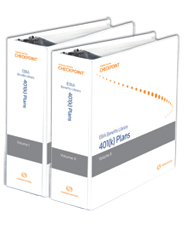Help answer client questions surrounding their 401(k) plans.
When it comes to navigating the tax landscape of 401(k) contributions and withdrawals, it’s important for accountants to stay informed and help clients make tax-efficient decisions during their retirement years.
Let’s take a look at some commonly asked questions and answers on 401(k) tax considerations for contributions and withdrawals.
Jump to:
Is a 401(k) pre-tax?
Yes. With a traditional 401(k), contributions are made using pre-tax dollars. This means that the funds are deposited into your retirement account before they are taxed — and you won’t owe any income tax on these funds until you withdraw the money from your account, typically after you retire.
Pre-tax contributions to a 401(k) effectively lower your taxable income by an equivalent amount, resulting in a current year reduction of your annual income tax liability.
Are 401(k) contributions tax deductible?
No. While your 401(k) contributions will lower your taxable income, they are not tax deductible because contributions are made using pre-tax dollars which means the money is taken out of your paycheck before the federal taxes on your income are figured in.
Are employer contributions to a 401(k) taxed?
While employee contributions to a 401(k) are typically made on a pre-tax basis, employer contributions may differ. Employer contributions, often referred to as employer matches, are not taxed when made. However, they may be subject to taxation upon withdrawal by the employee, depending on the type of 401(k) plan.
How is a 401(k) taxed?
The contributions you make to a 401(k) plan, plus any employer match and any earnings in the account are all tax-deferred which means you won’t owe any income tax on these funds until you withdraw money from your account in retirement.
What is the 401(k) tax limit?
For 2024, the contribution limit for employees who participate in 401(k), 403(b), and most 457 plans, as well as the federal government’s Thrift Savings Plan increased to $23,000, up from $22,500 in 2023.
The limit on annual contributions to an IRA increased to $7,000, up from $6,500. The IRA catch-up contribution limit for individuals aged 50 remains $1,000 for 2024.
The catch-up contribution limit for employees aged 50 and over who participate in 401(k), 403(b), and most 457 plans, as well as the federal government’s Thrift Savings Plan remains $7,500 for 2024.
What should I know about after-tax 401(k) contributions?
In addition to pre-tax contributions, some 401(k) plans offer an option for after-tax contributions. These contributions are made with income that has already been taxed, providing a potential avenue for tax diversification in retirement.
How does a traditional 401(k) compare vs a Roth 401(k) after tax?
Traditional 401(k)s are tax-deferred accounts, which means the account is funded with pre-tax dollars and you pay taxes on your distributions in retirement. Alternately, Roth 401(k)s are funded with post-tax money, so you don’t pay taxes on your distributions in retirement.
After-tax contributions to a 401(k) plan are similar to Roth contributions in that they’re made with after-tax dollars, and don’t reduce your taxable income in the year you make them.
Is there a 401(k) tax penalty?
Yes. Individuals who withdraw funds from a 401(k) before age 59 ½ may face a 10% early withdrawal penalty, in addition to regular income tax on the withdrawn amount.
 |
BookA must-have resource for employers, administrators, and advisors: EBIA 401(k) Plans on Checkpoint explains the IRC and ERISA requirements for 401(k) plans. |
What are some 401(k) tax benefits?
Not only do pre-tax contributions lower your taxable income, potentially placing you in a lower tax bracket, but the earnings on your contributions grow tax-deferred until you withdraw them at retirement. Additionally, certain employer contributions and matching programs provide further advantages.
What are the taxes on 401(k) withdrawals?
If you withdraw from your 401(k) before you reach age 59½, you may have to pay a 10% additional tax on the distribution. This tax applies to the amount received that you must include in income.
The 10% tax will not apply to distributions before age 59½ if you qualify for an exemption.
Are taxes automatically taken out of a 401(k) withdrawal?
Once you begin receiving distributions from your 401(k), you’ll owe income taxes on the funds. Some 401(k) plans will automatically withhold 20% to pay for taxes, however, you’ll want to check with your plan provider to see how your 401(k) works.
If you withdraw funds from your 401(k) before age 59½, it is your responsibility to manage tax obligations using Form 5329. Early distributions are typically subject to a 10% tax unless you qualify for an exemption.
At what age is 401(k) withdrawal tax-free?
The age at which 401(k) withdrawals become tax-free is generally 59 ½. Once you reach this age, you can withdraw funds from their 401(k) without incurring the 10% early withdrawal penalty. However, all withdrawals from your 401(k), even those taken after age 59½, are subject to ordinary income taxes.
What’s the tax rate on a 401(k) after age 59½?
After reaching the age of 59½, withdrawals from a 401(k) are subject to ordinary income tax rates. The specific tax rate depends on the individual’s overall income and tax bracket at the time of withdrawal.
What’s the tax rate on a 401(k) after age 65?
There is no distinct tax rate for 401(k) withdrawals after age 65. The tax rate continues to be based on the individual’s overall income and tax bracket at the time of withdrawal.
Can you avoid taxes on 401(k) withdrawals?
While it’s not possible to entirely avoid taxes on 401(k) withdrawals, strategic planning can help minimize the tax impact. Strategies like careful withdrawal timing, utilizing Roth conversions, and managing overall income can contribute to savings in retirement.
Let’s take a look at several strategies to minimize or delay taxes on 401(k) withdrawals.
- Contribute to a Roth 401(k). If your employer offers a Roth 401(k) option, you can contribute after-tax money to it. Withdrawals from Roth 401(k) accounts are tax-free in retirement, provided certain conditions are met.
- Convert to a Roth IRA. If you have a traditional 401(k), you can convert some or all of it to a Roth IRA. You’ll have to pay taxes on the amount converted in the year of the conversion, but qualified withdrawals from a Roth IRA are tax-free in retirement.
- Delay withdrawals. If you’re still working at age 72 or later, you can delay required minimum distributions (RMDs) from your 401(k) until you retire. This can potentially lower your taxable income in retirement.
- Use tax credits and deductions. In retirement, you might qualify for certain tax credits or deductions that can reduce your taxable income. Examples include the Retirement Savings Contributions Credit (Saver’s Credit) and deductions for medical expenses.
- Manage withdrawals strategically. Consider withdrawing from taxable accounts first before tapping into your 401(k). This can help you control your taxable income and potentially stay in a lower tax bracket.
Does a 401(k) attract capital gains tax?
A traditional 401(k) does not attract capital gains tax on investments within the account. The growth is tax-deferred until withdrawal, offering a valuable advantage for long-term retirement savings.
Is there a 401(k) inheritance tax?
While the inheritance itself is not subject to federal income tax, beneficiaries are generally required to pay income tax on distributions from the inherited 401(k). The assets in the account would be taxed at the beneficiary’s ordinary income tax rate, not the tax rate of the original account owner.
If the account is a Roth 401(k), you won’t owe any income taxes on the withdrawal.
Is there a 401(k) loan tax?
Unlike 401(k) withdrawals, you don’t have to pay taxes and penalties when you take a 401(k) loan — and the interest you pay on the loan goes back into your retirement plan account.
That said, while the loan is not subject to income tax, failure to repay it on time may result in penalties and additional taxes. If employment is terminated before loan repayment, it could trigger taxes and penalties as well.
 |
BlogNavigating state taxes on retirement income is a critical aspect of financial planning for retirees. While federal tax laws apply uniformly across the country, state tax regulations can vary widely. |
How to engage with clients on 401(k) tax considerations
As an accountant, you play a crucial role in keeping your clients informed about 401(k) and retirement tax considerations. Let’s take a look some strategies to engage your clients and strengthen your relationships with them as you guide them into their retirement years.
- Meet with clients on a regular basis throughout the year. Consider scheduling periodic meetings, phone calls, or video conferences with you clients to discuss updates to tax laws and regulations affecting 401(k) plans.
- Create regular communication channels. Compile a newsletter or email update on a quarterly or semi-annual basis to keep clients informed about recent tax changes, upcoming deadlines, and relevant financial planning strategies.
- Set up personalized alerts. Utilize tax software or client management systems to set up customized alerts for specific clients. These alerts can notify clients of significant tax law changes related to 401(k) plans and suggest appropriate actions.
- Showcase your knowledge. Host educational workshops or webinars focused on retirement planning and tax law updates. These sessions can provide clients with valuable insights and opportunities to ask questions in a group setting.
- Create custom reports. Prepare personalized reports or summaries for each client, highlighting how recent tax changes may impact their 401(k) plans and offering tailored recommendations based on their individual circumstances.
As you set out on your advisory path, remember to encourage your clients to engage in these channels and reach out to you firm with any questions or concerns they have regarding 401(k) tax changes. Fostering an open dialogue where clients feel comfortable discussing their retirement planning goals and tax-related matters can open the door to more meaningful relationships and sustained revenue.
And perhaps most importantly, by implementing regular communication strategies, your firm can empower clients to make more informed decisions about their retirement savings and help them to ensure a secure financial future.
How to stay up to date on 401(k) tax changes
With Checkpoint Edge, our cutting edge tax research tool, you’ll get all the latest tax updates, commentary, and insight on 401(k) tax law changes to help you stay one step ahead.
Alongside UltraTax CS, our professional tax preparation software with a full line of federal, state, and local tax programs, you’ll save time and boost productivity.
And with trusted methodology, guidance, and content solutions, Practice Forward can help your firm shift from a compliance-focused model to an advisory services approach that engages and sustains clients through their retirement years.
BlogTaxes on retirement income: Help for accountants advising clients. |
 |











